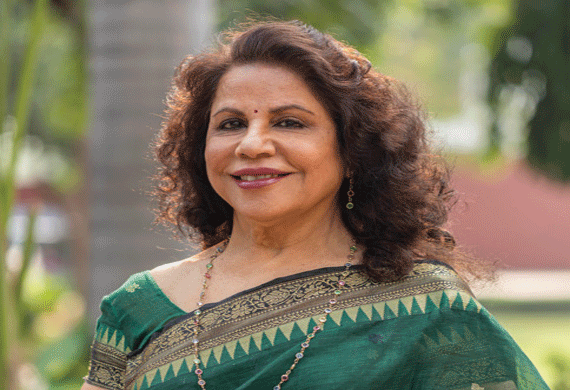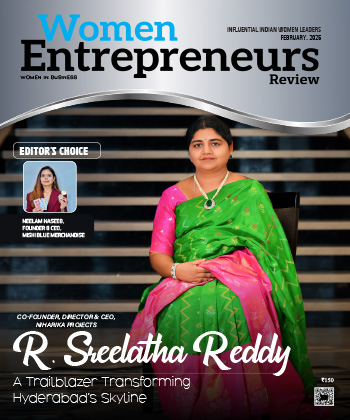
Women Entrepreneurs Hold The Key To India's Economic Growth
By: Dr. Hina Shah, Founder, ICECD
In India, women have risen to the highest in every walk of lifeas entrepreneurs, industrialists, civil servants, police officers, airline pilots, scientists, engineers, and in many other fields. Yet it takes women double the effort to achieve these heights despite there being no particular legal/ political barriers. And hence the Entrepreneurship Development Process for Women in India is becoming more and more important since women enterprise provides new employment opportunities and avenues for women's economic independence.
In the contemporary world, the role of women and their place in the economy has become the subject of concern. Theoretically, women have a place of honour and great respect; but, in reality, they are discriminated against at every stage of their lives and at every level. They are considered to be the weaker sections of the population, hence generally governmental policies and programs to assist the women are more welfare oriented than development oriented.
Women, who make 50 percent of the total population, are a big source of human resource. Thus developing entrepreneurial talent amongst women forms an integral part of the development of the economy.
Several years of my experience in developing women for Micro, Small and Medium Enterprise (MSME) development sector has yielded key findings of principles, procedures and practices by which thousands of women have been lead towards successful establishment of various enterprises creating employment for millions.
The process of becoming an entrepreneur involves learning, unlearning, and relearning several aspects of entrepreneurial roles, functions, and responsibilities. This indicates that the emergence of entrepreneurship is not an automatic process but one which requires special guidance to cultivate and nurture.
Women empowerment inculcates ability and capability to take their own decisions by breaking all personal limitations of the society and family. I have been a great believer in economic independence of women and have personally enjoyed the empowerment associated with entrepreneurship when I became an entrepreneur in 1978. As an experienced entrepreneur I have the flexibility and freedom to enjoy family, business, and economic independence. Hence, I have made it my mission to inspire and lead other women towards self-dependence and their empowerment.
The value of these insights lie not only in highlighting flawed planning procedures for women, but also in facilitating to build a concrete framework for replicating these experiences of developing women nationwide and their success becomes all the more credible, especially in a male dominated society.
Entrepreneurship is the process of bringing self reliance in women. This is my observation over the years and the same has been seen in Asia, Africa, and in Western countries. I believe that women have an extremely rich potential which needs to be tapped and given the right direction, can grow on to become successful entrepreneurs and so does their families.
Women entrepreneurship sector includes all activities of income generation, self employment and industry/business. Most activities are traditional in nature, with few being nontraditional depending on the geographical situation (rural/urban), socioeconomic and cultural background and gender relations within the society. The situation is further complicated by the variety of target groups of women, based on their income, location, education, experience and exposure. At one end of the spectrum are rural illiterate/less educated women, without any experience or exposure(65 percent of India's population is rural). The other end is represented by welltodo, urban, well educated women with exposure and even experience. Their development needs vary significantly and have to be met with a flexible approach to foster the women entrepreneurship development process within such a wide spectrum.
With the liberalized economy of India the MSME sector has become very important and it occupies the second position next to agriculture in terms of employment growth. The women within the MSME has become of utmost importance since the developmental process cannot afford to overlook the potential and problems of women (50% of the population) within this rapid growth process. Although the government policies and promotion strategies gave a few opportunities to women in the entrepreneurial fields, not many came forward. To promote women entrepreneurs as a part of national development plans have at all begun to be taken notice of by women. However, institutional, financial, cultural, gender based, policy and legal framework based factors continue to hinder women at large.
A Few Concerns:
Policies for Women's Entrepreneurship should follow a comprehensive approach rather piecemeal. They should encourage subsector clusters by providing infrastructure facilities and services like training and banking to MSMEs.
Government needs to ensure the availability of credit for fixed assets and working capital, focusing on timeliness and adequacy in line with gender related issues.
There is a need to periodically evaluate the impact of MSME-related policies on the success of women-owned businesses and suggestions should be given to national mission for entrepreneurship to be gender sensitive.
Role of Business Development Service Providers should address the needs of women, own enterprise and create awareness and improve access of women and to reduce barriers to their entry into business.
Role of regulatory department for SME needs to create conducive environment.
Today the status of women in MSMEs is only 14% which does not present a very positive picture. Hence we need to introduce Entrepreneurship Education at all levels from schools to universities.
Most Viewed
- 1 Women's Health Startup HerMD Closing Doors Amid Industry Challenges
- 2 5 Famous Women in Indian Armed Forces
- 3 Saudi Women No longer Require Male Permission for Clothing Choices, says Prince MbS
- 4 Kolkata Medtech Startup Innovodigm Raises Rs 5.5 Crore Seed Funding Led by IAN Group
- 5 Yamunanagar's Kashish Kalra Honoured after Securing 111th Rank in UPSC Civil Services Exam
- 6 Madurai Appoints Its First Woman Corporation Head
- 7 IAS Vijayalakshmi Bidari Appointed as the new Nagpur Divisional Commissioner
- 8 American Entrepreneur Lucy Guo Overtakes T Swift to become Youngest Female Billionaire
- 9 ICC Women's World Cup 2025 Trophy Showcased at Indore's Holkar Stadium
- 10 Aparna Saxena's Beauty Venture AntiNorm Launches in India
- 11 Vidya Nataraj Co-Founded BlueStone Jewellery & Lifestyle files IPO
- 12 5 Women Freedom Fighters of India
- 13 Dr. G Krishnapriya appointed as CEO for Trichy
- 14 M3M & Sirona Partner to Introduce Menstrual Hygiene Vending Machines in 15 Locations
- 15 Punjab Govt launches SHE Cohort 3.0 Supporting Tech-led Women Startups
- 16 Indian origin Lawyer, Sweena Pannu appointed as the US New Superior Court Judge
- 17 The Aurora Tech Award recognizes 4 Indian Women-led Startups
- 18 Kerala's Republic Day parade featured an all-female tableau
- 19 Manisha Kabbur Becomes Karnataka's First Woman International Karate Coach
- 20 Director K. S. Ravikumar's Daughter Maalica Ravikumar Launches Life Coaching Company 'Evergrowth Academy' for Women
- 21 Leezu's Raises Pre-Seed Funding to Accelerate Growth in Sexual Wellness Industry
- 22 Sattu: Super-easy summer drink for PCOS gut healing
- 23 Swathi Nelabhatla creates Sitha App, India's First Women-Exclusive Gig Platform
- 24 7 Timeless Female Kathak Dancers & their Iconic Legacies
- 25 Meet 7 Iconic Women Architects of Modern India & their Most Impactful Work
- 26 This Woman-led Insuretech Startup is Helping Bridge the Education Financing Gap in India
- 27 Women Leaders Share Lessons Learnt from India Women's WC Win
- 28 5 Enterprising Women Founders Powering Singapore's Tech & Innovation Landscape
- 29 4 Women. 4 Stories. One Vision for Smarter, Stronger Healthcare
- 30 Global Gender Gap Narrows to 68.8%, But Full Equality 123 Years Away: WEF Report 2025
- 31 Changemakers: 7 Women Entrepreneurs Taking the Make in India Movement Forward
- 32 Meet Lucy Guo, The Youngest Self-Made Female Billionaire Disrupting Tech
- 33 How Women are Driving India's Festive Online Shopping Surge






